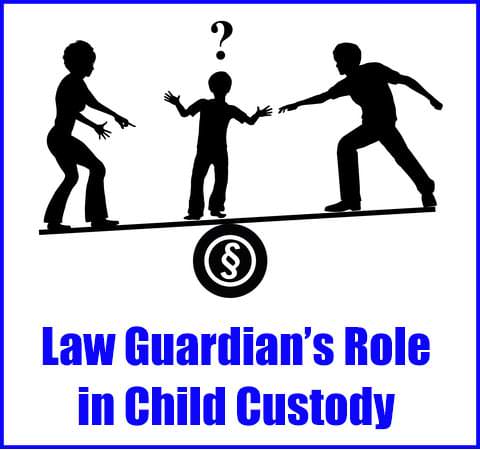
by Robert E. Hornberger, Esq | Aug 19, 2015
As a divorce attorney on Long Island, I’ve seen that child custody is one of the most contentious of issues in a divorce in Nassau County or Suffolk County courts. If custody of your unemancipated child(ren) is a contested issue during your divorce, chances are the judge assigned to your matter will appoint an attorney to represent your children, otherwise known as a Law Guardian. During your Long Island Divorce the Law Guardian has one purpose and one purpose only – to represent your children.
The Law Guardian’s Role in a Contested Long Island Child Custody Case
When meeting with a Law Guardian, he or she will speak to your children privately, although at times he or she will request to speak with you and your spouse as well. If your children see a therapist or attend school, the Law Guardian may also request to speak with those individuals to obtain additional information. However, once your children turn 18, neither you nor the Court can order them to live with either you or your spouse.
The Law Guardian plays the most important role in matters where parents are unable to agree with each other as it pertains to custody and visitation of their unemancipated children. In these cases, the Law Guardian’s goal is to shield your children from being placed in the middle of a nasty divorce battle between you and your spouse.
If your case proceeds to trial in Nassau County or Suffolk County court on the issue of custody, the Law Guardian will call witnesses and state his or her case just the same as your divorce attorney. However, the point which he or she will try to make may be different from that of your attorney – the Law Guardian will need to show that custody with one parent over the other is in the best interests of the child.
Can the Law Guardian’s Opinion Outweigh that of the Child’s Parents?
In some instances, parents will settle the issue of child custody and visitation without a trial. This is done by a Custody Agreement on Consent, meaning that both parents consent to the terms set forth therein. Naturally, one would assume that due to this the Court or the Law Guardian cannot appeal the agreement. However, the Second Department case of Velez v. Alvarez, which was decided on June 26, 2015, held that a Law Guardian may appeal from an order of custody on consent.
In Velez, the parties entered into a custody agreement on consent which provided that the parties would have joint legal custody of the unemancipated children. In the event the parties were unable to reach an agreement, the Mother would have final decision-making authority. However, this order was entered over the objection of the Law Guardian, and therefore, the Law Guardian had the right to appeal from said order.
The Court noted that although “the paramount concern in any custody or visitation determination is the best interests of the child, under the totality of the circumstances”, it cannot enter an order of custody “based upon controverted allegations without the benefit of a full hearing.” Velez v. Alvarez, 129 A.D.3d 1096 (2d Dep’t 2015). The Law Guardian felt the custody agreement entered into between the parties was not in the best interests of the children involved, and therefore, when the agreement was entered against his wishes, he appealed it. On appeal the Second Department found that the Family Court did not have sufficient facts in its possession to “render an informed and provident determination as to the best interests of the subject children.” Id. Therefore, the case was remanded to the Family Court for further fact finding inquiries.
How to Avoid Law Guardian Appealing Your Custody Agreement?
This case likely causes discomfort in the minds of many parents going through a divorce on Long Island. However, your Long Island divorce attorney should be equipped with the knowledge necessary to know how to prevent this type of outcome. First and foremost, any time there is an issue of custody your attorney should seek for you to be put on the record and for the judge to conduct a hearing. This way, any determination is based upon your sworn testimony, and not simply motion papers. Additionally, your Long Island divorce attorney should be prepared with witnesses whom he or she may call to testify on your behalf if need be. Because the law states there must be a hearing before a custody determination, it is in your best interests for your attorney to insist on a hearing being performed in your matter.
Questions About Child Custody and Visitation on Long Island?
See this page to learn everything you need to know about Child Custody and Visitation on Long Island.
To learn more about what you need to know about Child Custody on Long Island, visit this page on Child Custody or contact us at 631-923-1910 for a complimentary consultation.
Receive a Free Long Island Divorce Attorney Child Custody Consultation
For more information about how to protect yourself and your children during your divorce in Nassau County of Suffolk County, contact Long Island divorce attorney with great experience in contested child custody cases. Long Island’s Robert E. Hornberger, Esq., PC and his compassionate and experienced divorce lawyers can help. Call us at 631-923-1910 for a complimentary, confidential consultation or fill out the short form on this page and we’ll get right back to you.
Download our Free New York Divorce Guide
 Our 41-page “Guide to New York Divorce: What You Need to Know Before Hiring a Divorce Lawyer in New York” written by an experienced divorce lawyer Long Island’s Robert E. Hornberger, Esq., provides you with real information on the divorce process and the laws it rests upon in the state of New York. This book will help give you a solid foundation upon which you can begin the process of making your family’s, life better. Download your Free Guide to New York Divorce here.
Our 41-page “Guide to New York Divorce: What You Need to Know Before Hiring a Divorce Lawyer in New York” written by an experienced divorce lawyer Long Island’s Robert E. Hornberger, Esq., provides you with real information on the divorce process and the laws it rests upon in the state of New York. This book will help give you a solid foundation upon which you can begin the process of making your family’s, life better. Download your Free Guide to New York Divorce here.
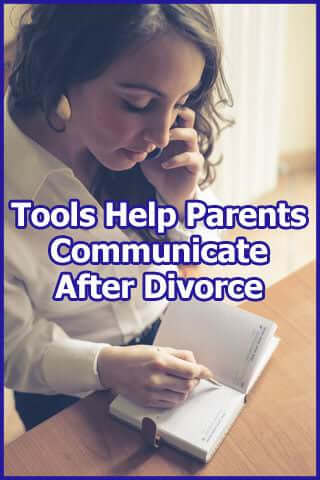
by Robert E. Hornberger, Esq | Jul 28, 2015
As a divorce lawyer on Long Island, I have seen that many couples, after their divorce, find it difficult to communicate with each other calmly and rationally regarding their children. At first, emotions are raw and it is unlikely you wish to engage in any type of communication with your now ex-spouse. After a time, emotions calm down but other issues develop that can complicate the issue.
As children grow older they become involved in a multitude of activities, making it difficult for both parents to enjoy consistent, uninterrupted, scheduled parenting time. The non-custodial parent often begins to feel as though the custodial parent is scheduling doctor’s appointments, swimming lessons or dance classes during his or her parenting time, when, in reality, this may have been the only time available. These types of miscommunications and assumptions are exactly what lead to fights and arguments down the road.
As a divorce attorney serving Suffolk County and Nassau County I encourage my clients to maintain open channels of communication with each other after their divorce is finalized. However, I realize this may be difficult as time goes on and their daily lives become less inter-twined. Therefore, when I received a brochure in the mail for a program called “The Our Family Wizard” I saw it as a useful tool for my clients and any potential clients.
What is “The Our Family Wizard”?
“The Our Family Wizard” is a computer software program designed to minimize miscommunication and arguments between parents who have joint legal custody of their children. Joint legal custody means that both you and your ex-spouse have the right to be involved in major decisions on behalf of your children, such as those relating to education, religion and health. The software, which contains the following features, can be installed on a desktop computer, laptop or downloaded as an application on a mobile smartphone.
1. Calendar. The calendar feature allows you and your ex-spouse to set the parenting schedule as you see fit. You have the ability to input information such as designated parenting time, requests for changes in the parenting schedule and the children’s after school activities or scheduled appointments. Families in Nassau County and Suffolk County use their phones for everything these days. Now, you can swap your old handwritten journal and schedules filled with parenting issues for a simple application on your iPhone, Droid, Blackberry or Kindle Fire. It will most likely be with you all the time and you won’t have to worry about losing that scrap of paper with your child’s reschedule soccer game ever again.
2. Message Board. With the message board you can communicate with your ex-spouse with the ease of an e-mail. You or your ex-spouse will receive an instant notification when the other makes an entry or a request for change on the calendar. This way, there is no chance of miscommunication, or either party failing to receive a message. Each and every message regarding your children is sent via “The Our Family Wizard” secure, private sever.
3. Expense Log. Perhaps the most important feature for Long Island couples who have been divorced in Nassau County or Suffolk County is the expense log. Most parents enter into child support agreements where they are each supposed to pay their pro-rata share of the cost of the children’s unreimbursed medical expenses and extracurricular and educational activities. In reality though, once couples are divorced and the children reside mainly with one parent, that parent tends to absorb the majority of the cost of the children’s day-to-day expenses. To combat this, these expenses can be tracked using “The Our Family Wizard” expense log feature. The paying parent has the ability to input all the appropriate information, including the amount of payment, what it was for and when it was made, and the software will calculate each parent’s pro-rata share. From there, the non-paying parent will receive notification of the payment and their share through the message board. Once the payment is received it may be marked as “paid,” which provides both parents with an easy way to keep track of those payments which are satisfied and those which are due and owning.
“The Our Family Wizard” takes the guess work out of co-parenting. You no longer have to provide your ex-spouse with receipts for every item purchased or co-pay paid for. You no longer have to call your ex-spouse every time you need to request a change in the parenting schedule. Having everything related to your children in one place makes the aftermath of a Nassau County or Suffolk County, Long Island divorce that much easier.
Receive a Free Divorce Attorney Long Island Consultation
For more information about how to keep the lines of communication open with your spouse before and after your Long Island Divorce, contact an experienced Long Island divorce attorney. Long Island’s Robert E. Hornberger, Esq., PC and his compassionate and experienced divorce lawyers can help. Call us at 631-923-1910 for a complimentary, confidential consultation or fill out the short form on this page and we’ll get right back to you
Download our Free New York Divorce Guide
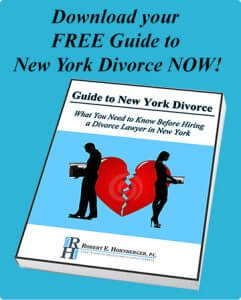 Our 41-page “Guide to New York Divorce: What You Need to Know Before Hiring a Divorce Lawyer in New York” written by an experienced divorce lawyer Long Island’s Robert E. Hornberger, Esq., provides you with real information on the divorce process and the laws it rests upon in the state of New York. This book will help give you a solid foundation upon which you can begin the process of making your family’s, life better. Download your Free Guide to New York Divorce here.
Our 41-page “Guide to New York Divorce: What You Need to Know Before Hiring a Divorce Lawyer in New York” written by an experienced divorce lawyer Long Island’s Robert E. Hornberger, Esq., provides you with real information on the divorce process and the laws it rests upon in the state of New York. This book will help give you a solid foundation upon which you can begin the process of making your family’s, life better. Download your Free Guide to New York Divorce here.
by Robert E. Hornberger, Esq | Jul 14, 2015
HOME ABOUT US OUR FIRM FIRM YOUR LEGAL TEAM ATTORNEYS YOUR ATTORNEYS ROBERT E HORNBERGER CHRISTINE M VERBITSKY ANNEMARIE LANNI LAWRENCE M. MARINO BRENDA LYNCH (Of Counsel) PRACTICE AREAS AREAS OF EXPERTISE What’s Involved In Divorce DIVORCE DIVORCE COLLABORATIVE...

by Robert E. Hornberger, Esq | May 13, 2015
 As a Long Island Divorce Lawyer, I have been captivated by the sweeping headlines of the past five years, and especially throughout the last couple weeks, regarding the heart-wrenching story of a Colorado man who never gave up hope of seeing his two daughters again. The story begins around 2010, when the man, Dennis Burns, was granted residential custody of his two children after a heated legal battle with his soon to be ex-wife, Ana Alianelli. Shortly thereafter, Ms. Alianelli took the parties’ two children to her native Argentina against both Burn’s wishes and the Court Order which stated the children were to reside with their father. After approximately five long years, numerous trips to Argentina, multiple court appearances and appeals and countless sleepless nights, Mr. Burns was finally reunited with his children in April 2015.
As a Long Island Divorce Lawyer, I have been captivated by the sweeping headlines of the past five years, and especially throughout the last couple weeks, regarding the heart-wrenching story of a Colorado man who never gave up hope of seeing his two daughters again. The story begins around 2010, when the man, Dennis Burns, was granted residential custody of his two children after a heated legal battle with his soon to be ex-wife, Ana Alianelli. Shortly thereafter, Ms. Alianelli took the parties’ two children to her native Argentina against both Burn’s wishes and the Court Order which stated the children were to reside with their father. After approximately five long years, numerous trips to Argentina, multiple court appearances and appeals and countless sleepless nights, Mr. Burns was finally reunited with his children in April 2015.
Please keep in mind there are underlying international abduction and kidnapping issues at play in the Burns’ matter; however, putting those aside for a moment, I believe the case highlighted certain aspects of custody battles which are important to couples experiencing similar circumstances in Nassau County and Suffolk County during their Long Island Divorce. In reading articles and watching news programs about the Burns family, the phrase “best interests of the child” was continuously mentioned.
If you’ve read in prior posts on the subject of Child Custody on this Long Island Divorce Law website, you will know that the best interests of the child is the standard used by the Courts in Nassau and Suffolk counties, and all divorce courts in New York state, when making a child custody determination.
Pretend for a moment there are no international issues involved, the parties in this case both reside within the State of New York and Ms. Alianelli legally relocated with the children from Long Island to Buffalo. Five years later, Mr. Burns files with the Family Court seeking a modification of the current child custody order to declare him the residential parent and order Ms. Alianelli to return the children to Long Island. Not only would the court consider whether the potential relocation was in the best interests of the children, but it would also consider whether the potential change in custody was in the child’s best interests.
Taking facts from the Burns’ matter and simply replacing Argentina with Buffalo, the court would certainly consider the fact that while in Buffalo with the children Ms. Alianelli refused to allow Mr. Burns reasonable access to them. Although there was an existing Court Order which directed Ms. Alianelli to allow Mr. Burns to communicate with the children via Skype three times a week, Ms. Alianelli continuously and willfully violated this Order. It is the court’s strong opinion that it is in the best interests of the children to have two loving and caring parents. Naturally, the court looks unfavorably upon one parent if he or she alienates the children from the other parent.
Furthermore, Ms. Alianelli refused to allow the children to speak to their paternal grandparents while in Buffalo. However, upon the children’s return to Long Island, Mr. Burns seems more than willing to facilitate their relationship with their mother, even permitting their mother to travel from Buffalo to Long Island with them and agreeing to allow their mother to enjoy supervised visitation with the children.
If you are seeking custody or a modification of custody you must demonstrate that you foster a relationship between not only the children and their other parent, but also between your children and the other parent’s family.
As stated, it is important to keep in mind there were underlying international issues at play in the Burns matter, however, the three factors previously mentioned play an extremely important role in your Long Island Divorce if there is a custody battle, or if you believe there is the potential for a custody battle. As much as you and your soon to be ex-spouse may not get along or cannot stand to be in the same room together, you cannot let that get in the way of the child or children’s relationship with their parents. If you truly seek to be the residential parent, you must facilitate and foster the relationship between your children and their other parent, as well as their relationship with the children and their extended family.
Questions About Child Custody and Visitation on Long Island?
To learn more about what you need to know about Child Custody on Long Island, visit this page on Child Custody or contact us at 631-923-1910 for a complimentary consultation.
Have Questions About Your Child Custody Case? Receive a Free Consultation from a Divorce Lawyer, Long Island’s Robert E. Hornberger, Esq.
If you have questions about your children’s custody or need more information about issues of Child Custody in Nassau County or Suffolk County on Long Island, you should immediately consult a local divorce lawyer. Long Island’s Robert E. Hornberger, Esq., PC’s compassionate and experienced divorce attorneys can help. Call us at 631-923-1910 for a complimentary, confidential consultation or fill out the short form on this page and we’ll get right back to you.
Download our Free New York Divorce Guide
 Our 41-page “Guide to New York Divorce: What You Need to Know Before Hiring a Divorce Lawyer in New York” written by an experienced Divorce Attorney Long Island’s Robert E. Hornberger, Esq., provides you with real information on the divorce process and the laws it rests upon in the state of New York. This book will help give you a solid foundation upon which you can begin the process of making your family’s, life better. Download your Free Guide to New York Divorce here.
Our 41-page “Guide to New York Divorce: What You Need to Know Before Hiring a Divorce Lawyer in New York” written by an experienced Divorce Attorney Long Island’s Robert E. Hornberger, Esq., provides you with real information on the divorce process and the laws it rests upon in the state of New York. This book will help give you a solid foundation upon which you can begin the process of making your family’s, life better. Download your Free Guide to New York Divorce here.
by Robert E. Hornberger, Esq | Mar 31, 2015
 As a Long Island divorce lawyer, my assistance is often sought to submit to the court a name change request on behalf of their minor children Nassau County or Suffolk County court. I have found that the general consensus regarding name changes in New York is that the process is quite easy. However, the reality of the situation is quite opposite.
As a Long Island divorce lawyer, my assistance is often sought to submit to the court a name change request on behalf of their minor children Nassau County or Suffolk County court. I have found that the general consensus regarding name changes in New York is that the process is quite easy. However, the reality of the situation is quite opposite.
Procedural Requirements for a Name Change in Suffolk County or Nassau County Court
In order to file a name change request, you must first download and fill out the appropriate forms from the New York State Unified Court System website. If you wish to do this on your own you must be careful, as there are different forms for “state” residents as opposed to “city” residents. Because my divorce attorney firm practices mainly in Nassau County and Suffolk County, this blog will discuss only how to file for a name change in those counties. After completing the requisite forms, you will need to file them with the court. There is a $210 filing fee in Supreme Court, as well as any additional fee associated with filing a Request for Judicial Intervention. A Request for Judicial Intervention is a necessary form that alerts the court to your request in order to have a judge assigned to the matter.
The Petition for an Individual’s Name Change requests information such as whether the minor (or individual seeking a name change) has ever been convicted of a crime, has ever filed for bankruptcy, or if there are any judgments or liens against the child or any property titled to the child. This information is requested because if the judge believes you are seeking to change your child’s name to commit fraud or otherwise avoid debts, liabilities and/or other responsibilities, it is likely your request will be denied.
What Do I Have to Show in Suffolk County or Nassau County Court for My Petition to Be Granted?
The recent Suffolk County case Matter of Dennington (Schaeffer), 2014 NY Slip Op 51735 (U)(2014), analyzed what may and may not be a valid reason to grant a name change petition.
The Petitioner, who alleged the child’s father was absent from the child’s life, sought to change the child’s last name to her own maiden name. After hearing conflicting testimony about the father’s role in the child’s life, the Court noted that deciding a name change petition must be done after an examination of the totality of the circumstances, and whether based upon those circumstances, granting the petition would be in the best interests of the child involved. Therefore, such a decision is not based solely upon the word of the moving party. Rather, the court will consider, among other things, whether changing the child’s surname would affect his or her relationship with either parent, how the child is known throughout the community, the extent to which the child identifies with his or her last name, and, if old enough, the child’s preference to have his or her named changed. Matter of Eberhardt, 83 A.D.3d 116, 123-24 (2d Dep’t 2011).
Additionally, even if a court finds a name change to be in the best interests of the child, there must still be a “compelling” reason to grant the name change, such as “where the natural father is guilty of misconduct, abandonment, or lack of support.” Matter of Dennington (Schaeffer), 2014 NY Slip Op 51735 (U)(2014). It is believed that unless one of the above is shown, such a decision is better left to the child when he or she reaches maturity. Id.
What if the Non-Custodial Parent is Delinquent in Child Support Payments?
What most likely caught your eye from the above decision is the statement that the lack of support may be a compelling reason to grant a name change application. However, it also must be known that while the Court in Dennington did note that the lack of support was a compelling reason, it also denied the Petitioner’s motion even though she alleged that the Respondent-Father was in arrears on child support and his wages were now being garnished. Therefore, it seems that there must be a gross lack of support for this to be sufficient grounds on which to base a name change application.
Your Long Island Divorce Lawyer Can Advise You Regarding Name Change Petitions in Suffolk County or Nassau County Court
Whether or not to file a name change petition on behalf of your minor child is a purely personal decision. As a Long Island divorce lawyer, I can only guide you as to the laws involved and the likely outcomes. If you have doubts as to whether your petition would be granted, you may take either the “wait and see” approach, and allow the child to make his or her own decision upon reaching the age of 18, or the “I’ll never know unless I try” approach and file now. As always, it is important to remember that the child will be affected by any name change, and you must be sure you are seeking this for the right reasons.
When you’re ready to move forward, give the experienced and compassionate Long Island divorce lawyers at Robert E. Hornberger, Esq., PC a call at 631-923-1910. We’ll help walk you through the process so you can decide for yourself which route is in your, and your child’s, best interests.
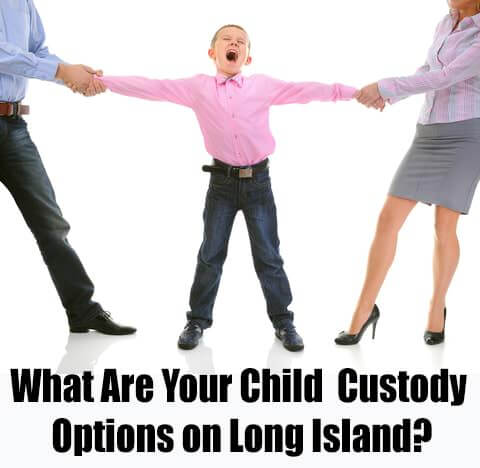
by Robert E. Hornberger, Esq | Feb 10, 2015
HOME ABOUT US OUR FIRM FIRM YOUR LEGAL TEAM ATTORNEYS YOUR ATTORNEYS ROBERT E HORNBERGER CHRISTINE M VERBITSKY ANNEMARIE LANNI LAWRENCE M. MARINO BRENDA LYNCH (Of Counsel) PRACTICE AREAS AREAS OF EXPERTISE What’s Involved In Divorce DIVORCE DIVORCE COLLABORATIVE...
by Robert E. Hornberger, Esq | Dec 2, 2014
 When you get divorced on Long Island, New York, you and your spouse will be faced with many decisions. One of those decisions will be what type of child custody arrangement you will enter into. While there are many types, the two most common are Joint Legal Custody and Joint Residential Custody, and both of these raise concerns when dealing with the child’s education.
When you get divorced on Long Island, New York, you and your spouse will be faced with many decisions. One of those decisions will be what type of child custody arrangement you will enter into. While there are many types, the two most common are Joint Legal Custody and Joint Residential Custody, and both of these raise concerns when dealing with the child’s education.
What is Joint Legal Custody?
Joint Legal Custody is an arrangement you and your spouse may enter into that allows you both to play a role in all major decision making on behalf of the child. This may include issues involving the child’s health, religion and education. Naturally, you and your spouse may opt to include other decisions as “major decisions” in your Settlement or Separation Agreement.
What is Joint Residential Custody?
Joint Residential Custody simply allows both parents to have physical custody of the children on an equal basis.
How do These Arrangements Play a Role in My Child’s Education?
As a divorce lawyer on Long Island, New York, I have a great deal of experience explaining the implications both joint legal and joint residential custody may have when it comes time to consider your child’s education. When you enter into a joint legal custody arrangement with your spouse, it is important to be aware that you both will continue to have the legal right to access any and all of your child’s educational records.
According to the Family Educational Rights and Privacy Act, educational records are anything that is maintained by a school that is receiving federal funding which contains information that would allow you to directly identify the student. This means that both you and your ex-spouse will have access to any records maintained by the school concerning your child. While this is of concern to some parents, if you are considering entering into a joint legal custody arrangement, it is likely that you and your spouse have a somewhat amicable relationship and you would not object to him or her being involved in the child’s education.
On the other hand, joint residential custody prevents a greater barrier to a child’s education than joint legal custody. Under Section 3202 of New York’s Education Law, children “are entitled to attend school in the District where they reside” tuition free. To establish residence within a specific district, the student and/or parent must show that the student is physically present within the confines of the school district and has the intent to remain there. If your child does not reside within the boundaries of a specific school district, they still may be entitled to attend school but on the condition that tuition be paid. You may be wondering how this ties into your Long Island Divorce, but it plays a greater role than you may imagine. If you and your spouse elect a joint residential custody arrangement, your child technically resides in two homes, and may be two school districts. For educational purposes, a child can only have one residence. Therefore, if you and your spouse reside in different school districts, your child may not be a resident of either and you may be faced with a situation of having to pay tuition for an otherwise free public school education.
How Can I Avoid This Problem?
The easiest way to prevent barriers to your child’s education is to elect to enter into a joint legal custody arrangement, with only one parent having residential custody. This way, both parents will have access to the child’s school records but the child will have one residence for purposes of the school districts. Your Long Island divorce lawyer can guide you as to specific parenting time schedules to be placed in your stipulation of settlement or separation agreement so both parents are provided ample time with the child.
A second possible solution is to elect a joint physical custody arrangement, but declare one parent the residential parent for educational purposes. This way, both parents may be permitted to have the child on an equal basis, but the child will attend school in the district of the designated parent. If you decide to enter such an arrangement, keep in mind that a school district may not provide your child transportation outside of the district’s boundaries. Therefore, you and your spouse may opt to live close to one another so you can provide transportation if the district refuses.
While each divorce is different, the above are a few general points of consideration to think about when faced with decisions regarding child custody on Long Island and how that will affect your child’s education.
Questions About Child Custody and Visitation on Long Island?
See this page to learn everything you need to know about Child Custody and Visitation on Long Island.
To learn more about what you need to know about Child Custody on Long Island, visit this page on Child Custody or contact us at 631-923-1910 for a complimentary consultation.
Compassionate Long Island Divorce Attorney Has Child Custody Answers
The experienced and compassionate divorce attorneys at Robert E. Hornberger, Esq. P.C. have helped hundreds of Long Island couples resolved their divorce and Child Custody and Support issues amicably and affordably. Contact us today at 631-923-1910 to schedule your free, no-obligation consultation with an experienced Long Island divorce attorney.
by Robert E. Hornberger, Esq | Nov 4, 2014
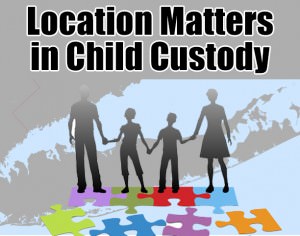 As a Long Island divorce attorney, I’ve seen that when planning a wedding, the last thing couples think of is how the location matters if they were to get divorced. Some couples may get married in New York State for the luxury of the Hamptons or the beautiful scenery upstate, but not live in New York. On the other hand, couples who have resided their entire lives in New York may decide to move out of state after their marriage. Years later, while residing in Massachusetts or Florida, that same couple may have a child and years after that, that same couple may decide that a divorce is the best option for them. While New York will have jurisdiction over the couple’s marital status because the marriage was performed in New York, that is not the only issue present in a divorce matter.
As a Long Island divorce attorney, I’ve seen that when planning a wedding, the last thing couples think of is how the location matters if they were to get divorced. Some couples may get married in New York State for the luxury of the Hamptons or the beautiful scenery upstate, but not live in New York. On the other hand, couples who have resided their entire lives in New York may decide to move out of state after their marriage. Years later, while residing in Massachusetts or Florida, that same couple may have a child and years after that, that same couple may decide that a divorce is the best option for them. While New York will have jurisdiction over the couple’s marital status because the marriage was performed in New York, that is not the only issue present in a divorce matter.
When you are discussing your pending divorce with your Long Island Divorce Attorney, it is important to inform him or her whether or not you have children with your partner, and more importantly where these children reside if they do not reside within New York State. Section 76 of New York’s Domestic Relations Law provides that New York may only make a determination of child custody if New York is the child’s home state on the date the action is commenced or “was the home state of the child within six months before the commencement of the proceeding and the child is absent from th[e] state but a parent or person acting as a parent continues to live in the state.”
Additionally, the Domestic Relations Law provides that New York may be able to exercise jurisdiction over an unemancipated child if no other state has jurisdiction over the child, or the home state of the child declines to exercise such jurisdiction upon the belief that New York is the more appropriate forum. If the child’s home state declines to exercise jurisdiction, such refusal must be grounded in the belief that the child and the child’s parents have a significant connection with New York aside from their physical presence, there must be substantial evidence in the state concerning the child’s care, protection, and personal relationships, and all courts which could exercise jurisdiction over the child have declined to do so.
What Does “Home State” Mean?
A common question parents have for their Long Island Divorce Attorney is “What does it mean for New York to be my child’s home state?” Thankfully, the New York legislature realized parents would have this question, and set forth an exact definition in the statute. A child’s home state is the state in which he or she resided with a parent or person acting as a parent for “at least six consecutive months immediately before the commencement of the child custody proceeding.” Domestic Relations Law § 75-a(7). Because the statute is very specific, it is clear that it is not sufficient that your child resided in New York sporadically throughout his or her life for a period totaling six months. But what about your three month old? The home state of a child under six months old is “the state in which the child lived from birth with any of the persons mentioned.” Id.
Although the statute permits New York to exercise jurisdiction over a child who resides within the state on the date of the commencement of the proceeding, Valentin v. Valentin demonstrates how the Second Department is inclined to look to where the child resided in the months immediately preceding the filing. Valentin v. Valentin, 167 A.D.2d 390 (2d Dep’t 1990). In that instance, the child resided in California with the mother “from about November 1987 to August 1988 when the child was taken to New York by the [] husband.” Id. at 391. The husband thereafter filed for divorce and demand for child custody in New York, alleging the New York courts could resolve issues of custody because the child was residing in the state on the commencement date. However, because the child had resided in California for nine months prior, California was deemed the child’s home state even though the child was now in New York. In other words, “New York cannot assume jurisdiction over [] custody [issues] pursuant to Domestic Relations Law §75-d(1)(b), [] if the child has a ‘home state’ other than New York. Id.
What Does This Mean for Me?
As always, your Long Island Divorce Attorney will provide you with the best advice in this area. But as long as you are aware that the most important thing for getting your child custody case into court is where your child has resided for the last six months, you are on a good path to begin.
Questions About Child Custody and Visitation on Long Island?
To learn more about what you need to know about Child Custody on Long Island, visit this page on Child Custody or contact us at 631-923-1910 for a complimentary consultation.
Long Island Divorce Attorney Can Answer Your Questions About Child Custody
Have questions about Child Custody on Long Island? The compassionate and experienced Long Island Divorce Attorneys at Robert E. Hornberger, Esq., PC are here to help. We have a long and successful history of representing couples and individuals in Nassau and Suffolk County in their Child Support and Custody matters. Contact us at 631-923-1910 for a complimentary divorce consultation, or fill out the form on this page and we’ll get right back to you.
by Robert E. Hornberger, Esq | Oct 7, 2014
As the Noncustodial Parent of Long Island Divorce, Can I Claim My Children as Dependents on my Income Taxes?
 As a Divorce Attorney on Long Island, I am often asked “who gets to claim the children on our taxes?” While you were married, it is likely that you and your ex-spouse filed joint income tax returns. You combined both of your incomes, and simply noted the number of children you had so you both were awarded the tax benefit of the children as dependents. However, along with a divorce comes the question of which parent can claim the children on their income tax returns, and how to make that decision. While you may automatically assume that the custodial parent is entitled to claim the children on his or her tax returns, this is not always the case and it is important to be aware of the possible outcomes.
As a Divorce Attorney on Long Island, I am often asked “who gets to claim the children on our taxes?” While you were married, it is likely that you and your ex-spouse filed joint income tax returns. You combined both of your incomes, and simply noted the number of children you had so you both were awarded the tax benefit of the children as dependents. However, along with a divorce comes the question of which parent can claim the children on their income tax returns, and how to make that decision. While you may automatically assume that the custodial parent is entitled to claim the children on his or her tax returns, this is not always the case and it is important to be aware of the possible outcomes.
Do You Have a Stipulation of Settlement in Your Long Island Divorce?
Many Long Island couples who are going through a divorce execute what is known as a Stipulation of Settlement. This document sets forth all the agreements you and your spouse have made regarding major issues, including child custody and support, what to do with the former marital residence, and property distribution.
An additional benefit of a Stipulation of Settlement is that you and your partner can include a section in the agreement concerning tax deductions and exemptions if you are both able to agree who will be claiming the children. What is becoming more commonplace is an agreement that the father will claim the children in odd years and the mother will claim the children in even years (or vice versa). If you have an odd number of children, such as three, it is not unheard of to permit the father to claim two children in odd years and one child in even years, with the mother claiming two children in even years and one child in odd years (or vice versa). Essentially, you and your ex-spouse can formalize any arrangement that you feel works best for you in your stipulation of settlement, and your Long Island divorce attorney may be able to suggest arrangements you had never thought of.
If Your Long Island Divorce Attorney Recommends Litigation
While you may want to execute a Stipulation of Settlement, it may be the case that you and your partner are simply unable to reach an agreement about one or more issues. In such instances, you can execute a Stipulation of Settlement for the issues you do agree on, and then may need to litigate on the issues you do not agree on. On occasion, the issue of which parent will claim the child as a tax deduction becomes an issue couples are unable to agree upon. In that case, the issue may require litigation. Although many believe that the custodial parent will be the one permitted to claim the child, that is not always the case; many consider that when both parents are contributing to the well-being of the child, and both parents should be entitled to the tax deduction.
Courts in New York have expressed this same sentiment. In Pachomski v. Pachomski, a Second Department case, both the custodial and the non-custodial parent were entitled to claim the children as dependents in alternating odd and even years for state and federal tax purposes. The Court reached its conclusion that “[w]here a noncustodial parent meets all or a substantial part of the child’s financial needs, a court may determine that the noncustodial parent is entitled to declare the child as a dependent” because both parents were wage earners and both contributed towards the support of the children. A similar conclusion was reached by the Court in Jurgielewicz v. Jurgielewicz. The father, who was the noncustodial parent was contributing “the majority[] of the financial support of the children.” The Court held that under the circumstances “[it] may determine that the noncustodial parent is entitled to declare the children as dependents on his or her income tax returns.” Additionally, the Court expressly stated that “it is within the sound discretion of the court to direct that the noncustodial parent be entitled to the dependency exemption for the purposes of filing income taxes where the custodial parent has little taxable income and, thus, is unable to take full advantage of the dependency exemption.” See Mojdeh M. v. Jamshid A. Therefore, the court is permitted to look at the circumstances of each individual case and consider the income of each parent when deciding a tax deduction issue.
A tax deduction is essentially a benefit granted to parents when they file their income taxes; it recognizes the amount of money required to care for and support children. When the children’s parents are married, both file income taxes jointly and both reap the benefits. However, when parents are divorced, who will claim the child can become an issue, and that is when it is time to speak to your Long Island divorce attorney for possible solutions.
The compassionate Long Island divorce attorneys at Hornberger Verbitsky, P.C. are very experienced at negotiating Stipulation of Settlements that fairly protect your interests today and into your future. Contact us at 631-923-1910 for a complimentary confidential divorce and family law consultation or fill out the short form on this page and we’ll get right back to you.
by Robert E. Hornberger, Esq | Jul 1, 2014
 The final school bell has rung in Long Island elementary and high schools, you’re children are going to be home for the next 2-1/2 months and now you have to figure out how your divorce and child custody agreements pertain to summer vacations.
The final school bell has rung in Long Island elementary and high schools, you’re children are going to be home for the next 2-1/2 months and now you have to figure out how your divorce and child custody agreements pertain to summer vacations.
Summer days get longer, people are generally happier (likely due to that extended sunlight), and children get to play outside until sunset.
If you are going through, or recently went through a divorce, the onset of your children’s summer vacation can cause you anxiety rather than relaxation. Because your divorce agreement likely sets forth a child custody arrangement, you may be wondering how these procedures will affect the children’s summer vacation. Naturally, you would like to take your vacation time when you can spend meaningful time with your children, but did you put that in your child custody agreement? Are you able to have your children with you for an uninterrupted week or two so you can maybe go away with them. Or, even if you can’t afford to stay out of town, can you just get some uninterrupted time when you can take day trips without having to worry about having them back in time for your ex’s visitation?
How Can We Avoid Problems With Summer Vacation and Custody?
If you are currently going through a divorce, it is important to discuss this matter with your divorce attorney. If the divorce agreement is not yet finalized, you and your partner can come to a mutual agreement regarding the children’s summer vacations. The agreement does not have to be specific to summer, it can be applicable to any school vacations the children may have.
At this point, you may agree that during the summer, the typical yearly custody schedule will be dispensed with. For example, if there are 10 or 12 weeks of summer, you and your partner could agree that you will get the children for six weeks, and your partner for the other six.
It would be wise to include the dates in the divorce agreement, this way, when the time comes, there is no room for error or alleging a miscommunication. Furthermore, having advance notice of the summer dates during which you will have custody of your children will allow you to schedule your own work vacation and any family vacation time around those dates.
On the other hand, you and your partner may decide to simply allot “vacation time” in the divorce and child custody agreements. In this instance, both you and your partner would be entitled to a specified amount of time per year deemed “vacation time.” The parent, at any point that the children are off of school, may then make use of this allotted time for trips or other quality events such as weekends away. If you and your partner do decide to allot vacation time, you should also make note in the divorce agreement if you do not want this time used on certain occasions, such as holidays or birthdays.
Do I Need Permission from My Ex-Spouse to Travel Out of State with Our Children?
There is no provision of New York’s Domestic Relations Law (which governs marital relationships and divorces), that imposes a duty on either parent to notify their ex-spouse if they plan to travel out of state with the children during scheduled visitation time. However, although there is no requirement placed on you by the State of New York to inform your ex-spouse if you plan a trip to Disney World, one may be created upon you by your specific divorce agreement.
As always, your divorce agreement controls the interactions between you and your ex-spouse and can expose you to liability for failure to comply with its terms. Even if your divorce agreement does not impose such an obligation, informing your ex-spouse of out-of-state travel plans will help foster a civilized relationship between you and make future interactions easier. Do not forget, if you have children together you will likely be in contact with each other for the rest of your lives, it is important to treat each other with respect from the beginning.
What Does This Mean For Me?
If your divorce is not yet finalized, do not forget to discuss the matter of vacation time with your Long Island divorce attorney. Having dealt with these issues numerous times, your divorce attorney will likely have experience with a number of creative, and practical solutions.
If, on the other hand, your divorce agreement is already finalized and these provisions are not included, or the current child custody provisions make vacation time impossible, be sure to discuss any options you have for modifying the agreement with your divorce attorney as this may require court involvement.
Questions About Child Custody and Visitation on Long Island?
To learn more about what you need to know about Child Custody on Long Island, visit this page on Child Custody or contact us at 631-923-1910 for a complimentary consultation.
Long Island Divorce Attorneys are Here to Help
The experienced and compassionate Long Island divorce attorneys at Hornberger Verbitsky, P.C. have dealt with all sorts of Divorce and Child Custody issues, both before agreements are signed and modifying them after. If you have questions about your divorce agreement or child custody arrangements, give us a call at 631-923-1910 or fill out the short form on this page and we’ll arrange for a convenient time for you meet us in a free initial consultation to discuss your issues.

 Our 41-page “Guide to New York Divorce: What You Need to Know Before Hiring a Divorce Lawyer in New York” written by an experienced divorce lawyer Long Island’s Robert E. Hornberger, Esq., provides you with real information on the divorce process and the laws it rests upon in the state of New York. This book will help give you a solid foundation upon which you can begin the process of making your family’s, life better. Download your Free Guide to New York Divorce here.
Our 41-page “Guide to New York Divorce: What You Need to Know Before Hiring a Divorce Lawyer in New York” written by an experienced divorce lawyer Long Island’s Robert E. Hornberger, Esq., provides you with real information on the divorce process and the laws it rests upon in the state of New York. This book will help give you a solid foundation upon which you can begin the process of making your family’s, life better. Download your Free Guide to New York Divorce here.



 As a
As a 















